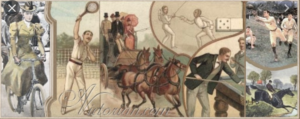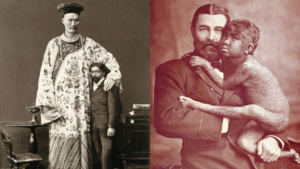Paul Rouse dropped into Off The Ball on Tuesday for the next stage of his History of Sport series, to look at how money and leisure time combined in Victorian society.
The UCD historian began by explaining how the Victorian British were the first to monetise leisure time and leisure activities.

Innovations such as going to the seaside and its associated activities such as buying postcards, fish and chip shops, selling ice-cream, and the opening of tea rooms all sprang up during the reign of Queen Victoria.
The influences made their way into Ireland. with Bray cited as an example of a Victorian-style seaside town where people would go on day trips and commercial activities sprung up around that.
There were also leisure activities that were far less wholesome. While the traditional view of the Victorians is misleading according to Rouse.
"The illusion of the Victorian strait-laced society just doesn't wash when you go beneath the surface," says Rouse.
"There were people out there who were trying to create a society where everything was rigid and organised and ordered, but it's not how it worked.
"The music halls for example around Dublin," says Rouse, "that was the English music hall culture that spread to Dublin. You'd get stars such as the 'Chinese Giant' and a man who was just called 'Dwarf' and 'The Elephant Man.'

"All of these were performers who came, were presented as 'freak shows.' All of these performers were part of a circuit that Dublin was on, along with Brighton and Blackpool."
Porn and opium: some night out
Alongside the shows, there were a couple more illicit industries emerging.
"Around this circuit, were two other things that must be noted," says Rouse, "Firstly there were drugs.
"Opium was relatively widely available and another drug called laudanum was widely used as well. These were serious drugs, available in large quantities.
"And number two, for all the talk about Victorian prudishness, this is a world that was filled with pornography.
"There were various studios who made a lot of money from selling and distributing pornographic images during this period.
"This spread into Ireland, now there was an attempt to regulate that.
"For example, three lads in Cork were caught with images of women they were sharing with each other at the start of the First World War and it ended up in a court case.
"Beyond that, there was the illicit distribution of all of this material and it was a thriving world within Victorian society, completely at odds with the image people would have.
"It is in this context that you must see the commercialisation of sport in this time, it is a commercialisation of leisure and people's free time."
Commercial
That commercialisation began in the 19th century and according to Rouse, is largely as it is today.
"If you look at the construction of our modern world of sport," says the historian, "look at sporting organisations that still dominate.
"All of those organisations were constructed at the end of the 19th century. Money was everywhere in their world, they both thrived on money, tried to create money, and sought to legislate for money."
Download the brand new GoLoud App in the Play Store & App Store right now! We've got you covered!
Subscribe to OffTheBall's YouTube channel for more videos, like us on Facebook or follow us on Twitter for the latest sporting news and content.








